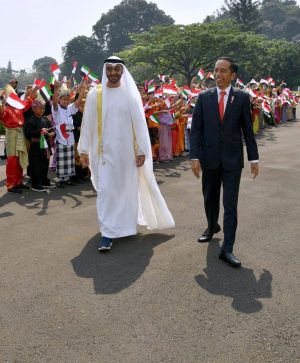On August 13, Israel and the United Arab Emirates reached a historic peace deal that will lead to a full normalization of diplomatic relations.
The agreement was the outcome of lengthy discussions between Israel, the UAE, and the United States that accelerated recently. The deal was sealed in a phone call between U.S. President Donald Trump, Israeli Prime Minister Benjamin Netanyahu, and Sheikh Mohammed Bin Zayed, crown prince of Abu Dhabi.
The agreement, known as the Abraham Accords, is the first of its kind since Israel and Jordan signed a peace treaty in 1994.
Israeli and Emirati representatives will meet in the coming weeks to sign bilateral agreements regarding investment, tourism, direct flights, security, telecommunications, and other issues, the statement said. The two countries are also expected later to exchange ambassadors and embassies.
While Indonesia is not directly associated with the deal, the country is a staunch defender of the Palestinian cause, the UAE’s close ally, as well as Israel’s quiet partner. In Indonesia, several questions have been raised concerning the agreement, including its impacts on Palestine. Such questions were particularly pertinent due to the fact that, a few days after the Israel agreement was signed, the UAE congratulated Indonesia on the 70th anniversary of its independence and reaffirmed their strong ties.
It seems that the Israel-UAE agreement will not change Indonesia’s position, although it may have an impact of Jakarta-Abu Dhabi relations.
For the past several years, Indonesia has maintained quiet ties with Israel. Although political ties are nonexistent, there have been flows of trade and investments, mainly done via Singapore, and some people-to-people exchanges have been taking place between Jakarta and Tel Aviv.
At the same time, the government in Jakarta has also sustained strong cooperation with the UAE. In fact, the UAE is one of Indonesia’s closest partners in the Middle East. Even during the COVID-19 pandemic, ties have been strengthened through aid and assistance provided by the government in Abu Dhabi.
Nonetheless, despite the quiet growth in Indonesia-Israel relations, and the close partnership between Indonesia and the UAE, it does not mean that Jakarta will follow the path taken by its close partner in normalizing its ties with its secret partner, Israel.
The most important reason for this is simple: Indonesia has not seen its relations with either Israel or the UAE as significant. While the Gulf countries have been trying to penetrate Indonesia with a “Looking East” policy, Jakarta has not been on the same page. Although Jakarta has gradually been strengthening ties with Middle Eastern countries, to this date, Indonesia remains unable to lessen its dependence on traditional partners such as China and the United States. Even if Jakarta saw the benefits of pursuing stronger cooperation with the UAE, it would not be because of Abu Dhabi per se, but the Middle East as a whole.
Moreover, since its independence, Indonesia has been opposing colonization and illegal settlement in occupied territories, including the West Bank, de jure Palestine. As seen in Indonesia’s previous policy toward South Africa, any unjust forms of colonization will be the main factor behind Indonesia’s refusal of diplomatic normalization with Israel.
The situation in the West Bank fits the criteria of colonialism. Israeli settlements politically resemble the European settlements in the New World; this settler colonialism scheme allows the settler to claim and use land while keeping direct ties with Israel proper.
And Indonesia’s position toward any kind of colonialism is clearly constituted in the Preamble to the Indonesian Constitution. The sentence “Whereas independence is the inalienable right of all nations, therefore, all colonialism must be abolished in this world as it is not in conformity with humanity and justice” unquestionably manifests the national stance against colonialism.
The settlement and annexation issues in the West Bank may recall Indonesia’s fierce criticism to apartheid South Africa. Indonesia only normalized its relation with South Africa in 1997 after the end of apartheid in the country.
Jakarta has been supportive of the Palestinian struggle since 1989, when Indonesia became the first country to recognize Palestine after its declaration of independence. Being vocal in Israel-Palestinian issues in the U.N., holding an Organization of Islamic Cooperation meeting on the subject in Jakarta, and giving 106.2 billion rupiahs in donations in 2018 are only three of the many forms of support Indonesia has given to the Palestinians.
In May 2020, Indonesian Foreign Minister Retno Marsudi reaffirmed that “Indonesia is one of the strongest supporters of Palestine” in response to Israel’s West Bank annexation plan.
Indonesia’s solidarity with Palestine is not only shown by the government but also by Indonesian citizens. Various types of private scholarships and other donations – including building a hospital — have been generously given to Palestine by Indonesia’s private organizations or individual donors.
Moreover, Indonesians are also frequently involved in solidarity protests such as protests against Israel’s annexation plan in 2020. This solidarity comes from emotional ties between Indonesian Muslims and Jerusalem, the third holiest city in Islam after Mecca and Medina.
Therefore, as stated by Marsudi, the recent agreement between the UAE and Israel will not change the status quo much. Ties between Indonesia and Israel will likely remain quiet in the years to come given Indonesia’s strong opposition toward colonialism and public support for the Palestinian cause.
What may change, however, is Indonesia’s relationship with the UAE. Jakarta may no longer see the UAE as a partner with shared stances on issues in the Middle East. Moreover, it may take more careful steps when dealing with the government in Abu Dhabi, especially because if the relationship continues as usual Indonesia is likely to face pressure from domestic Islamic groups and even the general public. There could also be repercussions for Indonesia’s standing in the Muslim world and for its growing ties with Arab countries who oppose the UAE’s move.
Muhammad Zulfikar Rakhmat and Mohamad Rezky Utama are lecturers at Universitas Islam Indonesia.

































